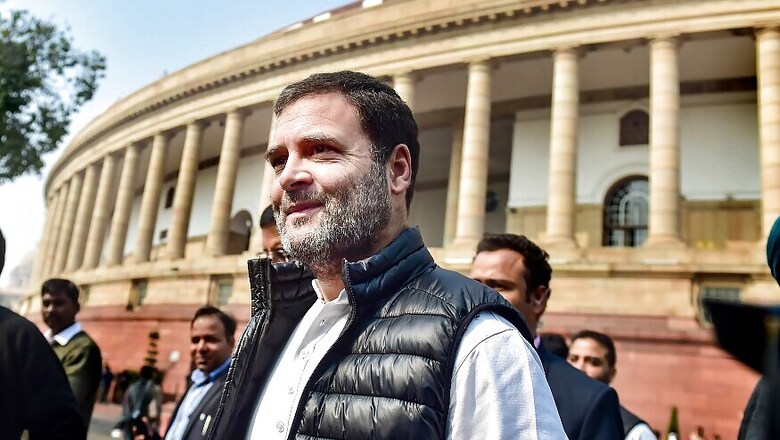
views
“Turning 50 doesn't mean you're approaching the end. It means you're nearing the top.”
Rahul Gandhi, who turns 50 on Friday, needs to ask himself if he is anywhere near the top now?
The Congress leadership issue is far from settled. Despite constant talk and speculation about Rahul’s likely return as AICC chief, Sonia Gandhi’s exit or retirement from active politics continues to rattle Congress party leaders at all levels of hierarchy. Their anxiety stems from experience of major changes each time a transition in the leadership takes place in the party.
For example, when Rajiv Gandhi replaced Sanjay Gandhi, many close Sanjay associates discovered they were ‘misfits’ in the elder brother’s team. Ram Chandra Rath, the powerful Youth Congress chief, found his influence waning quickly after Rajiv was appointed general secretary.
After Rajiv’s assassination, many of his aides like ML Fotedar were evicted by successor PV Narasimha Rao.
Sitaram Kesri’s rule saw the swift exit of Janardhana Poojary, Bhuvnesh Chaturvedi and others who were close to Rao.
When Sonia Gandhi took over, many leaders claiming proximity to Rajiv, Narasimha Rao or Kesri lost out.
While key Sonia advisors survived Rahul’s brief stint as 87th president of the Indian National Congress (from December 2017 to May 2019), there are broad signals that Rahul wants the old guard to fade away before resuming his second innings as Congress president.
Other than personalities, there is also a concern that Rahul’s elevation will be felt through his policies, planning and style of functioning.
Rahul’s economic and political thinking seems deeply influenced by left of centre. Senior Congress leaders recall Amartya Sen’s interview conducted by Vinod Mehta and Anjali Puri in the Outlook issue of August 2009 where the Nobel laureate had described Rahul as ‘talented’ and as someone deeply concerned about deprivation in India and wanting to make a change.
The noted economist had remarked, “I know him (Rahul) a certain amount. I once actually spent a day with him when he visited me in Trinity (Cambridge) and I was very impressed with him.”
Rahul was a student at Trinity from October 1994 to July 1995 and was awarded M. Phil in Development Studies. Sen, awarded the Bharat Ratna in 1999 by the Atal Bihari Vajapyee-led NDA government, had said that the possibility of Rahul becoming prime minister could not be ruled out.
‘… we chatted about what he was planning to do. At that time, politics was not part of his plan at all, and he told me that. I believe those were his genuine views and he changed his mind later. It was very clear to me that he was very committed to Indian development.”
Sen said he had told Rahul that there were ways for him to “dazzle the world” with the money he could make. “But he wasn’t in the least interested. I would say, since I have known Manmohan Singh at the same age, that there was a very similar commitment in both of them, in terms of being deeply concerned about deprivation in India and wanting to make a change in that. And to devote one’s lifetime to that.”
Cambridge seems to have influenced Rahul quite a bit. Speaking to the Cambridge campus paper Varsity in 2010, Rahul had told Merrow Golden and Ashleigh Lamming, two political science students, that the most important thing he learned at Cambridge was the “importance of compromise”.
Lamming recalls Rahul as saying the Cambridge system had helped him learn how to not just “argue for his own opinions, but to find a solution that takes all points of view into account”.
Aarthi Ramachandran, author of an independent biography on Rahul called Decoding Rahul Gandhi (Tranquebar 2012), has elaborately quoted Lamming as saying that during the interview, Rahul had expressed himself as an ‘economist’.
“He tended to talk about things using economic language; he talked about affirmative action as being a problem of “supply and demand”, and talked about teachers no longer having a “monopoly” over information, but being one of the many sources of it.”
Apparently, during the interview, Rahul reached for a pen and drew an elaborate economic diagram to illustrate a teacher as being one competing source of information. Lamming added that Rahul appeared very fond of Cambridge as a town, and of Trinity College in particular.
Rahul told him that he had changed a lot since completing his M. Phil in 1995. He disagreed with a lot of what he was taught at Cambridge. “I am a lot less Left-wing now than I was, for one thing.”
In 2020, some senior Congress leaders think Rahul Gandhi has gone back to what was taught to him in 1994-1995 at Cambridge University - a lot more Left wing than 2009-10 when UPA was in power and Dr Manmohan Singh was prime minister.
In the Congress circles, Sonia Gandhi is seen as too tolerant a person who avoids enforcing discipline but has a knack for winning over adversaries and reaching out to alliance leaders. In contrast, Rahul is seen among the ranks as a leader in the Rajiv–Sanjay mould -- frank and decisive. His thrust on technology, youth and gender sensitivity may force many party leaders and regional satraps to shape up or ship out.
The present-day Congress doesn’t lack leaders who want a Rahul-led Congress to taste every electoral success but wish he fails in his efforts to cleanse the party. This paradox is the biggest challenge before Rahul and Congress.




















Comments
0 comment